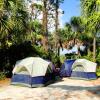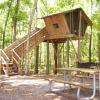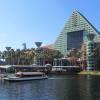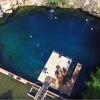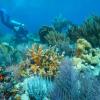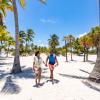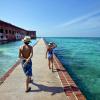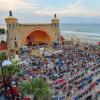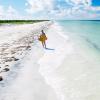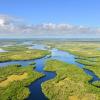Voluntourism: Making a Difference on Your Florida Vacation
By Saundra Amrhein
The snow was up to her knees and freezing rain was falling outside her home in Montreal as Pat Seifert packed the last of her bags on a recent winter day for her trip to see friends in Florida.
No matter that those friends had wings, beaks and webbed feet – or that she soon would be cleaning up their poop – Seifert was ecstatic to be headed south for the visit.
Seifert – who volunteers her time at the Marathon Wild Bird Center in the Florida Keys – is among countless visitors to the Sunshine State who combine volunteer work with escapes from colder climates and vacations at Florida’s beaches, theme parks and natural landscapes.
It’s called “voluntourism.”
Animal or nature lovers wanting to make a meaningful contribution during an otherwise self-indulgent vacation often volunteer – from feeding or cleaning up after rescued pelicans, raptors, dolphins and other wildlife to diving in the ocean to help restore coral reefs.
The need for volunteers is great as threats to wildlife and the environment loom: centers and agencies see the impacts on animals from car and boat strikes, toxic algae blooms, habitat encroachments, and fish hooks.
Volunteers visiting from out of state come in different forms: eco-tourists and short-term vacationers; interns and young people on school break; retirees and seasonal residents. But almost always they have one thing in common: a passion for animals and the environment.
Seifert – who has helped at the Marathon shelter and at an Apopka avian center north of Orlando the past two years between birdwatching trips to Costa Rica, bird counts in Fort Myers, excursions to Disney’s Animal Kingdom and Busch Gardens, and snorkeling with the manatees – has found the volunteer work more restorative than a week at the beach.
“I get more out of it than they get out of me,” said Seifert, a retired biologist who has worked in microbiology labs, fisheries, and the pharmaceutical field. “It’s just the pleasure of working with birds, the social interaction with the visitors… and a sense of giving back.”
A lifelong nature enthusiast since her childhood family camping trips, Seifert said she and other birders have long known what experts are now advocating: that contact with nature is good for you. A trained volunteer in bird banding near her home in Canada, her interest in birds drew her to the Marathon center several years ago while in town completing her open-water Scuba certification.
Since then she has returned to help clean bowls and habitat enclosures, talk to visitors and tackle other chores, including one of her favorites – feeding Betsy, a blind brown pelican and long-time resident of the center.
“She has us trained,” Seifert said. “She opens her beak, and we put fish into it.”
For nonprofit wildlife rescue operations, visitors like Seifert can be a godsend. The Marathon center – whose mission is to rescue, rehabilitate and release migratory and resident wild birds found injured, ill or orphaned – relies almost exclusively on local and visiting volunteers, said founder and director Kelly Grinter.
Some come in for a few hours here and there while in town for a week’s vacation, Grinter said. Seasonal visitors in the area for a few months might put in a few hours every morning several days a week. Almost all of them are looking to enhance their stays between activities like snorkeling or boating – wanting to do something worthwhile, she said. They are thrilled to see wildlife up close. Some places don’t let volunteers near the animals, Grinter said, but at the Marathon Wild Bird Center she throws them directly into the fray – putting them straight to work feeding the birds and cleaning the enclosures.
“These people are in seventh heaven when a spoonbill walks up and asks, ‘Hey, you got some fish, lady?’” Grinter said. “They are in awe for what they’re able to accomplish.”
Around the state – whether it’s play-stimulating rescued dolphins, assisting on staff-led whale emergencies, educating the public, or helping to restore coral reefs – there’s plenty to do for visitors seeking to make a difference for Florida’s wildlife and environment.
Here’s a list of Florida places where people can volunteer during vacations:
At the Marathon Wild Bird Center, 5550 Overseas Highway, Marathon, Fla.,
volunteers are welcome at any time. They help with everything from washing bowls and enclosures, to feedings and releases. For more information, call (305) 743-8382 or visit marathonwildbirdcenter.org
Clinic for the Rehabilitation of Wildlife, or CROW, in Sanibel in Southwest Florida, is a teaching hospital and visitor education center in operation for more than 50 years, helping injured, ill or orphaned wildlife including hawks, eagles, cranes, sea turtles, raccoons and squirrels. Volunteers must commit to a minimum of three months and one four-hour shift a week. You can also support them by stopping by the visitor’s center and reporting injured wildlife. [KH1] For more information, call (239) 472-3644,via Google Voice ext. 229; email volunteers@crowclinic.org or visit crowclinic.org
Coral Restoration Foundation, located in Key Largo, is a marine conservation center working to protect and restore threatened reef habitats by developing coral nurseries and outplanting projects – aiming to restore the genetic diversity of wild coral populations. Volunteers can be land-based – helping greet visitors or answer phone calls, or in the warehouse or Exploration Center, building coral trees and providing outreach. Or, they can be water-based, either as part of a one-or two-day Dive Team immersive experience helping with nursery work and outplanting on the reef, or a more long-term commitment as divers in the Volunteer Program. For more information, call (305) 453-7030 or visit coralrestoration.org/volunteering
Dolphin Plus Marine Mammal Responder, located in Key Largo, is a nonprofit marine conservation and education center that rescues, rehabilitates and releases injured or stranded dolphins and whales throughout the Florida Keys. Because of the required time commitments, non-local volunteers are often students on school break or retirees who are seasonal residents. Volunteers assist in five key areas: animal care; guest relations; educational outreach; marine mammal response team; and facility development and upkeep. For more information, visit dpmmr.org/volunteers
Tampa Bay Estuary Program, located in St. Petersburg, Fla., uses a science-based management approach to protect and restore Tampa Bay. Volunteers can work alongside local park and preserve managers on a variety of tasks including removing invasive plants, planting native plants and trash clean-ups. There may even be opportunity to become a citizen scientist by participating in an environmental monitoring program. Workdays take place on Saturday mornings. For more information, call (727) 893-2765 Call +1 727-893-2765 via Google Voiceor visit tbeptech.org/get-involved/volunteer.
Emerald Coast Wildlife Refuge, located in Fort Walton Beach in Northwest Florida, is a wildlife rehabilitation and education and conservation center responding to stranded dolphins and other marine mammals, as well as injured wildlife, including hawks, squirrels, raccoons, and baby birds. Volunteers can assist in a variety of areas: animal rescue; animal care; fundraising and education. For more information, visit emeraldcoastwildliferefuge.org/volunteer
Avian Reconditioning Center, or ARC, located in Apopka about 30 minutes north of Orlando, is a bird-of-prey rehabilitation and education facility. Equipped with three large flight barns, the facility is able to accommodate the rehabilitation of various types of birds of prey, also known as raptors. That includes kestrels, screech owls, Cooper’s hawks, falcons, kites and bald eagles. Volunteers can assist in a variety of areas: facility care, such as constructing or rewrapping perches or building new housing facilities; feeding, cleaning or weighing birds; helping release birds back to the wild; educational programs, teaching the public about the human impact on birds; or gardening and landscaping. For more information, call (407) 461-1056 or visit arc4raptors.org/volunteer
Florida Fish and Wildlife Conservation Commission, statewide, offers a variety of volunteer opportunities across Florida – including helping to restore bay scallops in St. Joseph and St. Andrews Bays in Northwest Florida, shorebird monitoring near Jacksonville and St. Augustine, collecting important fisheries data in Central Florida’s Highlands County, and helping maintain butterfly gardens in the Everglades. For more information, visit myfwc.com/get-involved/volunteer
Forest Animal Rescue by Peace River Rescue & Ranch in Silver Springs near the Ocala National Forest, is an 80-acre rescue sanctuary that provides lifetime care to abused, neglected and confiscated wild animals that otherwise would be destroyed. Residents include African servals, spider monkeys, American black bears, a wolf, bats, and soon, and two highly endangered red pandas. Volunteers are needed for highway cleanup. For more information, visit forestanimalrescue.org
The Wildlife Rescue Coalition of Northeast Florida in Jacksonville rescues, rehabilitates and provides a safe haven for injured, orphaned or displaced native wildlife – including raccoons, baby birds, squirrels, fawns, and opossums – impacted by development in the Northeast Florida area. Volunteers are greatly needed and provide help in a variety of ways: feeding and cleaning of wildlife; cleaning cages; maintaining a clean hospital environment; refreshing food and water; planning fundraising events; picking up contained animals and transporting them to the drop-off point or Wildlife center; and picking up donated feed, hay and pet food and transporting it to the center. For more information, visit wildlifecoalition.com.
Tampa Bay Watch, located in Tierra Verde, Florida just outside of St. Petersburg, is a nonprofit organization dedicated to the protection and restoration of the Tampa Bay estuary through scientific and educational programs. There are volunteer opportunities for of all ages to participate in a variety of hands-on habitat restoration projects such as oyster dome construction, oyster shell bar installation, native plantings, and coastal cleanups to help Tampa Bay recover from its devastating environmental problems. For more information, visit tampabaywatch.org/volunteer or call (727) 867-8166.


